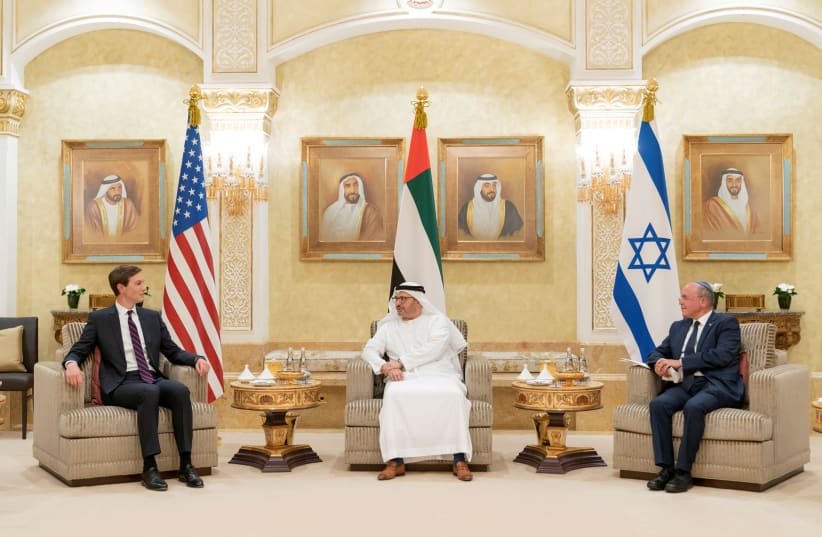The United States announced on Tuesday that it would host delegations from Israel and United Arab Emirates next week for a special signing ceremony at the White House, barely one month after word of the Abraham Accord between the Jewish state and the Gulf nation first broke.
The breakneck speed with which the official White House ceremony was announced surprised several former members of Israeli diplomatic negotiation teams, who shared with The Media Line their thoughts about the curious turn of events.
“A formal agreement takes a lot of time to articulate and draft. It has to go through legal experts who weigh every word,” Brigadier General (ret.) Michael Herzog, a Washington Institute international fellow, told The Media Line. “Next week is probably going to be just a symbolic ceremony commemorating the recent breakthrough. It apparently will be something more general, like a letter of intent.”
“It’s no coincidence it’s done in such a hurry,” notes Herzog, who participated in most of Israel's negotiations with the Palestinians, Jordanians, and Syrians since the early 1990s, including the Wye Plantation, Camp David, Taba and Annapolis summits. “The Americans want to do it before the [presidential] elections. But the order of things is reversed. First they have a ceremony and only then they’ll try to translate that into a series of bilateral pacts.”
Gilead Sher, a senior researcher at the Institute for National Security Studies who served as former prime minister Ehud Barak’s chief of staff, agrees. “I think this whole story still hasn’t been made clear to the public,” Sher told The Media Line. “We know just the general outline [to the agreement], and maybe that’s all they’re going to sign. That would explain the timetable.”
“But there was never a real conflict here,” continued Sher, who was Israel's top peace negotiator in 1999–2001, at the Camp David and Taba summits, and participated in the 1995 Oslo talks as well. “There were no combat zones, no territorial disputes, no violence. This isn’t a historic breakthrough after a long, drawn-out negotiation, but merely a normalization of relations already over 25 years old.”
“This is simply a diplomatic cover for what is essentially a financial and military deal. Therefore, I don’t think it’s too complicated [to arrange the ceremony].”
According to a White House source, the ceremony will be held on September 15 and will be attended by US President Donald Trump. Israeli Prime Minister Binyamin Netanyahu released a statement thanking President Trump for hosting the “historic” ceremony and announced he would “proudly” attend the event. However, the UAE delegation will apparently consist of only second-tier dignitaries, headed by Foreign Minister Abdullah bin Zayed Al Nahyan.
Sher and Herzog both see the move as significant.
“It says a lot,” Herzog emphasizes. “It means that despite all the advancements made by [UAE leader Mohammed bin Zayed] and the brave step he took [in normalizing relations with Israel], the Emiratis still have certain inhibitions and some sensitivity towards the Palestinian question and Arabic public opinion.
“Perhaps there are other issues bothering them, like Israel’s statements regarding the F-35 [fighter jet] deal. But you just can’t ignore the fact that two leaders are present and the third is absent,” says Herzog.
Sher warned Netanyahu was “making a diplomatic mistake” by personally attending the event. “We’re upgrading the delegation on our side while the Emirati’s downgrade their representatives,” he said. “This is a way for [the UAE] to send a message to its people – ‘don’t make such a big deal out of this’”.
On August 13, President Trump announced he had brokered a deal to normalize ties between Israel and the UAE. The UAE agreed to officially recognize Israel’s right to exist and to solidify economic and trade relations with the Jewish state. In return, Netanyahu consented to postpone his plans to annex territories in the West Bank indefinitely, while also reportedly greenlighting an arms deal between the UAE and the Trump administration that would include the sale of state of the art F-35 fighter jets to the Gulf nation.
Netanyahu has since denied agreeing to such a deal.
It still remains unclear whether Alternate Prime Minister and Defense Minister Benny Gantz or Foreign Minister Gabi Ashkenazi, both bitter political rivals of Netanyahu, will join the prime minister on his trip to Washington. Gantz’s office declined to respond to The Media Line’s request for comment.
As to the actual ceremony, both former diplomats see it as mere theatrics.
“The rules are that everything is hammered out and scripted, down to the most minute details,” Sher shares, noting that the heads of states’ addresses, standing positions, and lineup are all determined in advance. “They also agree ahead of time on the press releases, that usually tend to include an extra nugget, some ‘fresh news’ to entice reporters and the public.”
But Sher notes there may be exceptions to the rule, when things go off-script, “either because one of the actors forgets his role or because he intentionally wants to provoke the other sides, trying to gain one last concession from his negotiating partners.
“[The late PLO chair Yasser] Arafat was a master of trying to squeeze that last drop out of the lemon,” Sher remembers. “Something can always go wrong.”
Says Herzog, “There is always room for surprise. Arafat was unexpected. I can definitely see Trump doing something to surprise everyone.”
